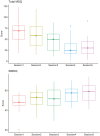Functional Medicine Approach to Patient Care Improves Sleep, Fatigue, and Quality of Life in Patients With Inflammatory Bowel Disease
- PMID: 36777428
- PMCID: PMC9802250
- DOI: 10.1093/crocol/otac032
Functional Medicine Approach to Patient Care Improves Sleep, Fatigue, and Quality of Life in Patients With Inflammatory Bowel Disease
Abstract
Background: A Functional Medicine program was developed at an inflammatory bowel disease (IBD) center with the goal of integrating strategies to address modifiable lifestyle factors and to complete a 6-week elimination diet under the direction of a trained Functional Medicine dietitian and Functional Medicine providers.
Methods: From January 2019 to November 2019, patients with controlled, but persistent, symptoms from IBD were offered enrollment. Each of the 5 visits incorporated an educational session focused on nutrition followed by a session focusing on modifiable lifestyle factors. The patients were placed on a supervised 6-week elimination diet. At each visit, patients completed the SIBDQ (Short Inflammatory Bowel Disease Questionnaire), FSS (Fatigue Severity Scale), PSQI (The Pittsburgh Sleep Quality Index), and MSQ (Medical Symptoms Questionnaire). Statistical analysis was performed using the Wilcoxon matched pairs signed-rank test.
Results: Nineteen patients enrolled (2 men: 1 ulcerative colitis [UC], 1 Crohn's disease [CD]; 17 women: 3 UC, 14 CD). 15 patients completed all modules. There was improvement in all patient-reported outcomes (PROs) (FSS, P < .001; PSQI, P < .001; SIBDQ, P < .001; MSQ, P < .001). Every patient who completed the last session demonstrated weight loss.
Conclusions: The psychoemotional roots to immune disease states, particularly IBD, are complicated and often not addressed in traditional care. We are just beginning to understand the impact of nutrition, sleep, stress, movement, and relationships on IBD. In this cohort, utilizing Functional Medicine as an adjunct to traditional care resulted in improvement in all PROs.
Keywords: Crohn’s disease; Functional Medicine; inflammatory bowel disease; ulcerative colitis.
© The Author(s) 2022. Published by Oxford University Press on behalf of Crohn's & Colitis Foundation.
Figures



References
-
- Malik TA. Inflammatory bowel disease: historical perspective, epidemiology, and risk factors. Surg Clin North Am. 2015;95(6):1105–1122, v. - PubMed
-
- Malik TA, Mannon P.. Inflammatory bowel diseases: emerging therapies and promising molecular targets. Front Biosci. 2012;4(3):1172–1189. - PubMed
-
- Bernstein CN, Singh S, Graff LA, Walker JR, Miller N, Cheang M.. A prospective population-based study of triggers of symptomatic flares in IBD. Am J Gastroenterol. 2010;105(9):1994–2002. - PubMed
-
- Asakura H, Suzuki K, Kitahora T, Morizane T.. Is there a link between food and intestinal microbes and the occurrence of Crohn’s disease and ulcerative colitis? J Gastroenterol Hepatol. 2008;23(12):1794–1801. - PubMed
-
- Martini GA, Brandes JW.. Increased consumption of refined carbohydrates in patients with Crohn’s disease. Klin Wochenschr. 1976;54(8):367–371. - PubMed
LinkOut - more resources
Full Text Sources
Miscellaneous
